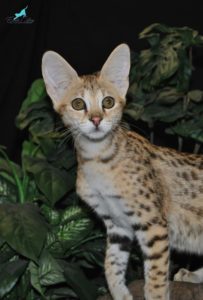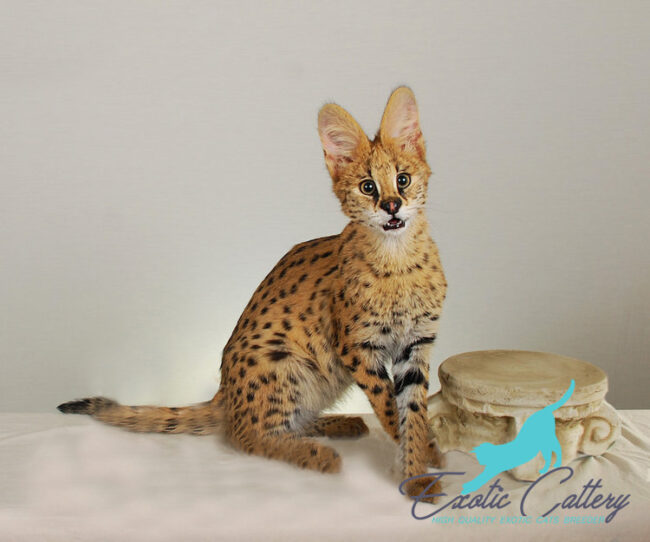The Differences Between Serval Kittens and Other Exotic Cats in Australia: A Comprehensive Guide
Exotic cats, especially servals, are becoming popular pets in Australia. Serval kittens for sale in Australia attract many people because of their unique looks and playful personalities. These cats are native to Sub-Saharan Africa and are medium-sized wild cats. They have long legs, large ears, and beautiful golden-yellow coats with black spots and stripes. This striking appearance can sometimes confuse them with other wild cats like cheetahs and leopards, but servals have unique traits that make them different.
While serval kittens are charming, potential owners need to know they are not typical pets. According to the article, Serving the Servals: Unravel the Mysteries of a Wild Cat, servals have specific needs that make them unsuitable for most homes. They are solitary animals, living independently outside of breeding seasons, and they need plenty of space to roam and explore. Their natural instincts lead them to engage in behaviors like scent marking and hunting, which can be hard to manage in a home setting.

The Differences Between Serval Kittens and Other Exotic Cats in Australia A Comprehensive Guide
Additionally, serval kittens are known for their high energy and playful nature. They need a special diet that mimics their natural prey, which is quite different from regular cat food. As mentioned in the article, Considering a Serval Cat? Know the Risks of Having One, these kittens require a large, secure outdoor area to thrive, making them less suitable for small apartments or homes without enough outdoor space.
On the other hand, hybrid breeds like Savannah and Ashera cats may have a more domesticated temperament, making them better suited for family life. For example, Savannah cats are a mix of servals and domestic cats, keeping some wild traits while being more adaptable to home environments. This adaptability is essential for potential pet owners in Australia considering exotic cats as companions. Understanding the unique needs and behaviors of serval kittens is vital for responsible pet ownership, ensuring that both the animal and owner can thrive together.
For those interested in learning more about the differences between servals and other exotic breeds, the article Savannah Cats as Pets: The Alarming Rise in Popularity offers valuable insights into the care requirements and suitability of these fascinating animals. Ultimately, while serval kittens can be affectionate and playful, their wild nature means they require dedicated care and a lifestyle that can accommodate their unique needs.
Serval Kittens: An In-depth Look
Serval kittens are captivating animals that attract attention with their striking looks and playful behavior. Native to Sub-Saharan Africa, these medium-sized wild cats have unique physical features, including long legs, large rounded ears, and a golden-yellow coat with black spots and stripes. This distinctive appearance can lead to confusion with other exotic cats like cheetahs and leopards. However, servals are not typical pets and need specialized care that many potential owners may not be ready for.
One important factor to consider when looking at serval kittens for sale in Australia is their wild ancestry. Unlike hybrid breeds like Savannah and Ashera cats, which show more domesticated traits, servals keep many of their wild instincts. They are known for their high energy and playful nature, needing plenty of space to roam and explore. As noted in the article from Petful, serval kittens need a large, secure outdoor area to thrive, making them less suitable for small apartments or confined living spaces.
Moreover, servals have specific dietary needs that mimic their natural prey, which can be hard to provide in a typical household. They need a diet rich in protein and may require regular veterinary check-ups to monitor their health, as highlighted in the article from Serving the Servals. This level of care can be demanding and may not fit the lifestyle of many prospective pet owners.
Additionally, servals are generally solitary animals, living independently outside of breeding seasons. They do not form long-lasting bonds with humans like domestic cats do, which can make them less affectionate and more challenging to socialize. As stated in the Quora discussion, while serval kittens can show affection, their wild nature means they may not behave like traditional pets, requiring significant time and effort in training and socialization.
In contrast, hybrid breeds like Savannah cats, which are a mix of serval and domestic cats, tend to adapt better to home environments. They often have a more balanced temperament, making them a more suitable choice for families. Understanding these differences is crucial for anyone considering bringing a serval kitten into their home. For those interested in exotic pets, it is essential to assess your living situation and lifestyle to ensure you can meet the unique needs of these remarkable animals. For more insights on exotic cat ownership, check out the article on Savannah cats as pets.
In summary, while serval kittens are undeniably beautiful and intriguing, they come with challenges that require careful consideration. Potential owners should thoroughly research and understand the specific care needs of servals before making a commitment.

Experience the unique bond between humans and F1 Female Savannah cats
Comparing Servals to Savannah Cats
When comparing servals to Savannah cats, it’s essential to understand their distinct characteristics, care needs, and suitability as pets. Servals, native to Sub-Saharan Africa, are medium-sized wild cats known for their striking appearance, which includes long legs, large ears, and a golden-yellow coat with black spots and stripes. These features not only make them visually appealing but also enhance their hunting abilities, allowing them to leap up to 9 feet to catch prey like birds. However, their wild nature means they are not suitable as household pets. Servals are solitary creatures, leading independent lives outside of breeding season, and they require a specialized diet and ample space to thrive. Their strong hunting instincts and territorial behaviors can pose challenges for potential owners, making them less ideal for typical home environments (Serving the Servals: Unravel the Mysteries of a Wild Cat).
In contrast, Savannah cats are a hybrid breed, resulting from a cross between servals and domestic cats. This breeding has produced a cat that retains some wild traits but is generally more adaptable to home life. Savannah cats are known for their loyalty and playful nature, making them suitable for families. They tend to have a more balanced temperament compared to servals, which allows them to integrate better into household settings. Their care needs, while still requiring attention, are less demanding than those of servals, making them a more practical choice for potential pet owners (Considering a Serval Cat? Know the Risks of Having One).
Another exotic breed worth mentioning is the Ashera cat, which is bred for its friendly disposition and exotic appearance. Ashera cats are often marketed as hypoallergenic and can be quite expensive. They require specific care, similar to Savannah cats, but their unique traits make them a less common choice among exotic cat enthusiasts (Savannah cats as pets: the alarming rise in popularity of …).
In summary, while serval kittens may captivate with their wild ancestry and playful nature, they demand specialized care and environments that mimic their natural habitat. On the other hand, Savannah cats offer a more domesticated temperament, making them a more suitable option for families and first-time exotic cat owners. Understanding these differences is crucial for anyone considering bringing an exotic cat into their home, especially for those searching for Serval Kittens for Sale Australia. Potential owners should carefully assess their living situation and lifestyle to ensure they can meet the unique needs of these fascinating animals.
Ashera Cats: How They Compare to Servals
As exotic pets gain popularity, many potential owners find themselves comparing unique breeds like Ashera cats and servals. Understanding the differences between these two breeds is crucial for anyone considering adding a wild cat to their home. Servals, native to Sub-Saharan Africa, are medium-sized wild cats known for their striking appearance, characterized by long legs, large ears, and a golden-yellow coat adorned with black spots and stripes. These features not only make them visually appealing but also enhance their hunting abilities, allowing them to leap up to 9 feet to catch prey like birds. However, servals are not typical household pets. Their wild instincts and specific care needs make them challenging to manage in a domestic environment. According to a study on servals, they require ample space to roam and a diet that mimics their natural prey, which can be difficult to provide in a typical home setting.
In contrast, Ashera cats are a designer breed that combines the traits of servals, domestic cats, and even the Asian leopard cat. They are bred for their friendly disposition and adaptability, making them more suitable for family environments compared to servals. Ashera cats tend to exhibit a more domesticated temperament, which can be appealing for first-time exotic cat owners. However, they also come with a hefty price tag and specific care requirements that potential owners should consider. The Petful article emphasizes the importance of understanding the unique needs of each breed, including diet, exercise, and socialization.
While serval kittens are known for their playful and energetic nature, they retain many wild instincts that can complicate their care. They are generally solitary creatures, leading independent lives outside of breeding season, and their territorial behavior can pose challenges in a home environment. On the other hand, Ashera cats, being hybrids, often adapt better to home life while still retaining some wild traits. This adaptability makes them a more practical choice for those looking for an exotic pet.
In summary, when considering exotic pets like servals or Ashera cats, it is essential to assess your living situation and lifestyle. Serval kittens require a large, secure outdoor space and a specialized diet, making them less suitable for small apartments. In contrast, Ashera cats may offer a more balanced temperament and adaptability, making them a better fit for families. For those in Australia looking for exotic cats, understanding these differences is vital to ensure responsible pet ownership. For more insights on exotic cats, check out the Savannah cats as pets article.
Care Requirements for Serval Kittens and Other Exotic Cats
Caring for serval kittens and other exotic cats requires a deep understanding of their unique needs and behaviors. Serval kittens, known for their playful and energetic nature, are not typical household pets. They are wild animals with specific care requirements that can be challenging to meet in a domestic environment. Unlike domesticated breeds, servals retain many of their wild instincts, making them less suitable for small living spaces. They require ample room to roam and play, ideally in a secure outdoor area that mimics their natural habitat. This is crucial for their physical and mental well-being, as servals are highly active and need space to express their natural behaviors, such as climbing and jumping.
A proper diet is another critical aspect of caring for serval kittens. Their nutritional needs differ significantly from those of domestic cats. Servals are carnivorous and require a diet that closely resembles their natural prey, which includes rodents, birds, and small mammals. This means that potential owners must be prepared to provide a specialized diet, often involving raw meat, to ensure their health and vitality. Regular veterinary check-ups are also essential to monitor their health, as servals can be prone to specific health issues that require professional attention. For more information on the dietary needs of servals, you can refer to the article on Considering a Serval Cat? Know the Risks of Having One.
In contrast, hybrid breeds like Savannah and Ashera cats may offer a more domesticated temperament, making them more suitable for family environments. Savannah cats, for instance, are a cross between servals and domestic cats, and they tend to adapt better to home life while still retaining some wild traits. This adaptability can make them a more practical choice for first-time exotic cat owners. Ashera cats, on the other hand, are bred for their friendly disposition and can be more expensive, but they often require specialized care as well. Understanding these differences is crucial for potential pet owners in Australia considering exotic cats as companions.
Moreover, servals are generally solitary creatures, leading independent lives outside of breeding season. They are not known to be aggressive towards people, but their strong hunting instincts and territorial behaviors can pose challenges for owners. Engaging in regular training and socialization is vital to help them adjust to a domestic setting. For those interested in learning more about the unique characteristics of servals, the article Serving the Servals: Unravel the Mysteries of a Wild Cat provides valuable insights.
In summary, while serval kittens can be affectionate and captivating, their care requirements are extensive and demanding. Potential owners must assess their living situation and lifestyle to ensure they can meet the needs of these unique pets. For those considering adopting a serval kitten, it is essential to conduct thorough research and prepare for the commitment involved in caring for such an exotic animal.
Legal and Ethical Considerations in Australia
When considering the purchase of serval kittens for sale in Australia, it is crucial to understand the legal and ethical implications involved. Servals are wild cats native to Sub-Saharan Africa, and their unique needs and behaviors make them unsuitable as typical household pets. According to the article on Serving the Servals, servals possess distinct physical characteristics, including long legs and large ears, which aid in their hunting abilities. These traits, while fascinating, also highlight the challenges of keeping a serval as a pet.
In Australia, the ownership of serval kittens is subject to strict regulations. Many states require permits to own exotic animals, including servals, due to their wild nature and specific care requirements. Potential owners must ensure they comply with local laws, which may include habitat specifications, dietary needs, and veterinary care. The Petful article emphasizes that serval kittens require a specialized diet and a large, secure outdoor space to thrive, which can be difficult to provide in a typical home environment.
Ethically, the decision to own a serval should not be taken lightly. These animals are not domesticated and retain many wild instincts, making them challenging to care for. As noted in the Quora discussion, while servals can be affectionate, they are not easily tamed like domestic cats. This can lead to behavioral issues if their needs are not met, resulting in stress for both the animal and the owner.
Moreover, the rising popularity of exotic pets, including servals, raises concerns about their welfare and conservation. The Discover Wildlife article highlights the importance of understanding the implications of owning such animals, as they often require environments that mimic their natural habitats. Potential owners should consider whether they can provide the necessary care and space for a serval, as well as the long-term commitment involved.
In conclusion, while serval kittens may be captivating, prospective owners in Australia must navigate a complex landscape of legal and ethical considerations. It is essential to conduct thorough research and ensure that one can meet the specific needs of these wild cats before making a decision. For those interested in exotic pets, exploring more domesticated alternatives, such as Savannah or Ashera cats, may be a more suitable option.
Assessing Suitability: Is a Serval Kitten Right for You?
Assessing whether a serval kitten is the right pet for you involves understanding their unique needs and characteristics. Serval kittens, native to Sub-Saharan Africa, are wild cats that possess distinct physical traits, such as long legs and large ears, which aid in their hunting abilities. Unlike domestic cats, servals are not typically suited for household environments due to their wild instincts and specific care requirements. They are known for their energetic and playful nature, but this energy comes with a need for ample space and stimulation, making them less suitable for small living spaces like apartments.
One of the primary considerations for potential owners is the serval’s diet and health care needs. Servals require a specialized diet that mimics their natural prey, which can be challenging to provide in a typical household setting. Regular veterinary check-ups are essential to monitor their health, as they can be more demanding than domestic cats in this regard. According to a study on serval care, these cats engage in behaviors like scent marking and are highly territorial, which can lead to challenges in a home environment.
In contrast, hybrid breeds like Savannah and Ashera cats may offer a more domesticated temperament, making them more suitable for family life. Savannah cats, for instance, are a cross between servals and domestic cats, and they tend to adapt better to home environments while still retaining some wild traits. This adaptability can be a significant factor for first-time exotic cat owners. As highlighted in the article Considering a Serval Cat? Know the Risks of Having One, potential owners should carefully assess their living situation and lifestyle to ensure they can meet the needs of these unique pets.
Moreover, serval kittens are known for their affectionate nature, but they are not as easily tamed as domestic cats. This can pose challenges for new owners who may expect a more traditional pet experience. Understanding the specific requirements of serval kittens, including their need for a large, secure outdoor space, is crucial for responsible pet ownership. If you are considering bringing a serval kitten into your home, it is essential to weigh these factors carefully and ensure that you can provide an environment that meets their needs. For more insights on exotic cats, check out the article on Savannah cats as pets, which discusses the rising popularity of hybrid breeds and their suitability as pets.
Conclusion: Making an Informed Decision
Making an informed decision about bringing a serval kitten into your home requires careful consideration of various factors. Serval kittens, while captivating due to their unique appearance and playful nature, are not typical pets. They are wild animals with specific needs that can be challenging to meet in a domestic environment. Understanding these needs is crucial for potential owners in Australia who are considering adopting a serval kitten.
Servals are medium-sized wild cats native to Sub-Saharan Africa, known for their long legs, large ears, and distinctive golden-yellow coats with black spots. Unlike domestic cats, servals retain many wild instincts, which can make them difficult to care for as pets. They require ample space to roam and play, making them less suitable for small apartments. Their energetic nature means they need a secure outdoor area where they can explore and engage in natural behaviors, such as climbing and hunting. According to a study on serval kittens, these cats have strong hunting instincts and are highly territorial, which can lead to behavioral challenges if not properly managed.
In contrast, hybrid breeds like Savannah and Ashera cats may offer a more domesticated temperament, making them more suitable for family environments. Savannah cats, for instance, are a cross between servals and domestic cats, and they tend to adapt better to home life while still retaining some wild traits. This adaptability can be a significant advantage for first-time exotic cat owners. Ashera cats, on the other hand, are bred for their friendly disposition and can be a better choice for those looking for a more manageable exotic pet. Potential owners should consider the specific care needs of serval kittens, which include a specialized diet that mimics their natural prey and regular veterinary check-ups to monitor their health, as highlighted in the article on considering a serval cat.
Before making a decision, it is essential to assess your living situation and lifestyle. Owning a serval kitten is a long-term commitment that requires time, resources, and a deep understanding of their unique behaviors. If you are considering a serval kitten for sale in Australia, ensure you are prepared to meet their needs and provide an environment that allows them to thrive. For more information on the differences between serval kittens and other exotic breeds, you can refer to the Savannah cats as pets article, which provides valuable insights into the care and suitability of these fascinating animals.
In conclusion, while serval kittens can be affectionate and playful, their wild nature means they may not always behave like traditional domestic cats. It is crucial to invest time in training and socialization to ensure a good match for your lifestyle. By understanding the specific requirements of serval kittens and considering alternative breeds, you can make an informed decision that benefits both you and your future pet.



